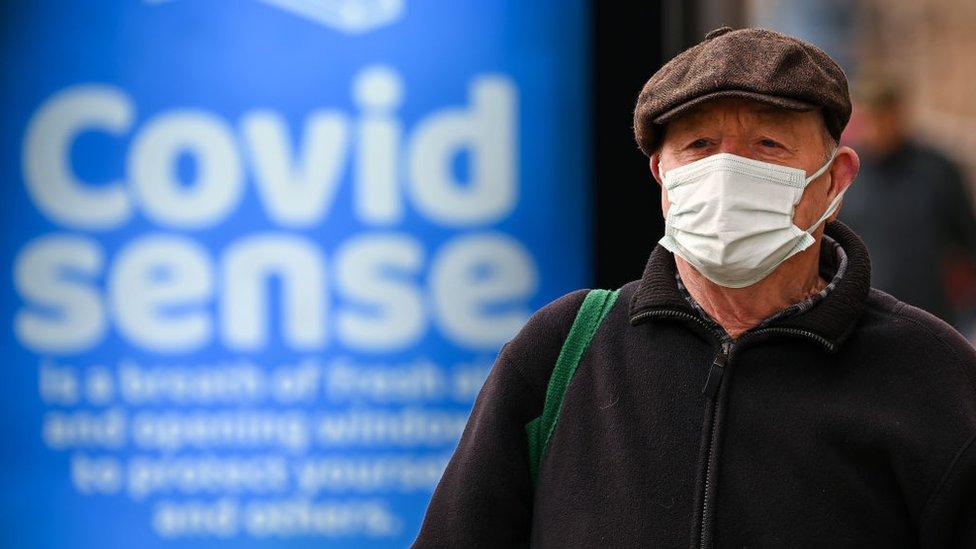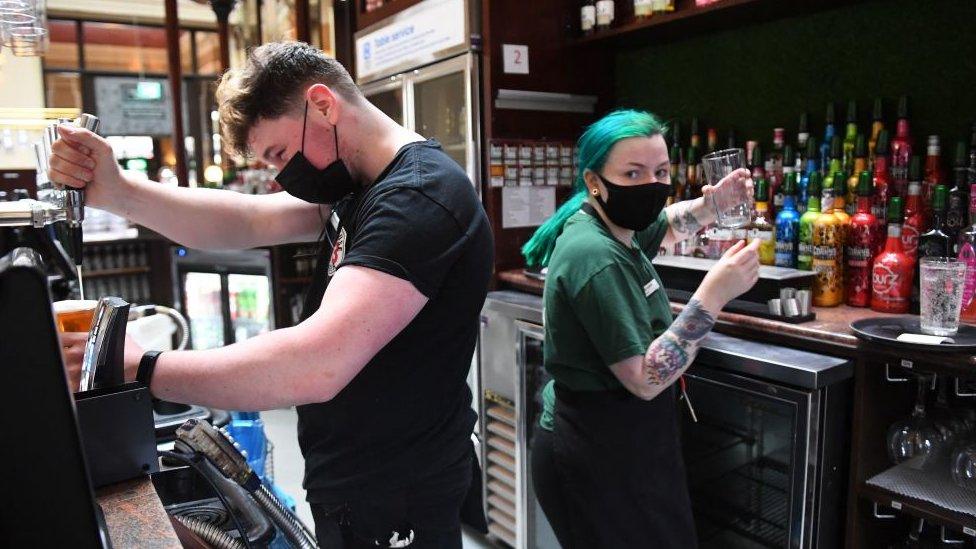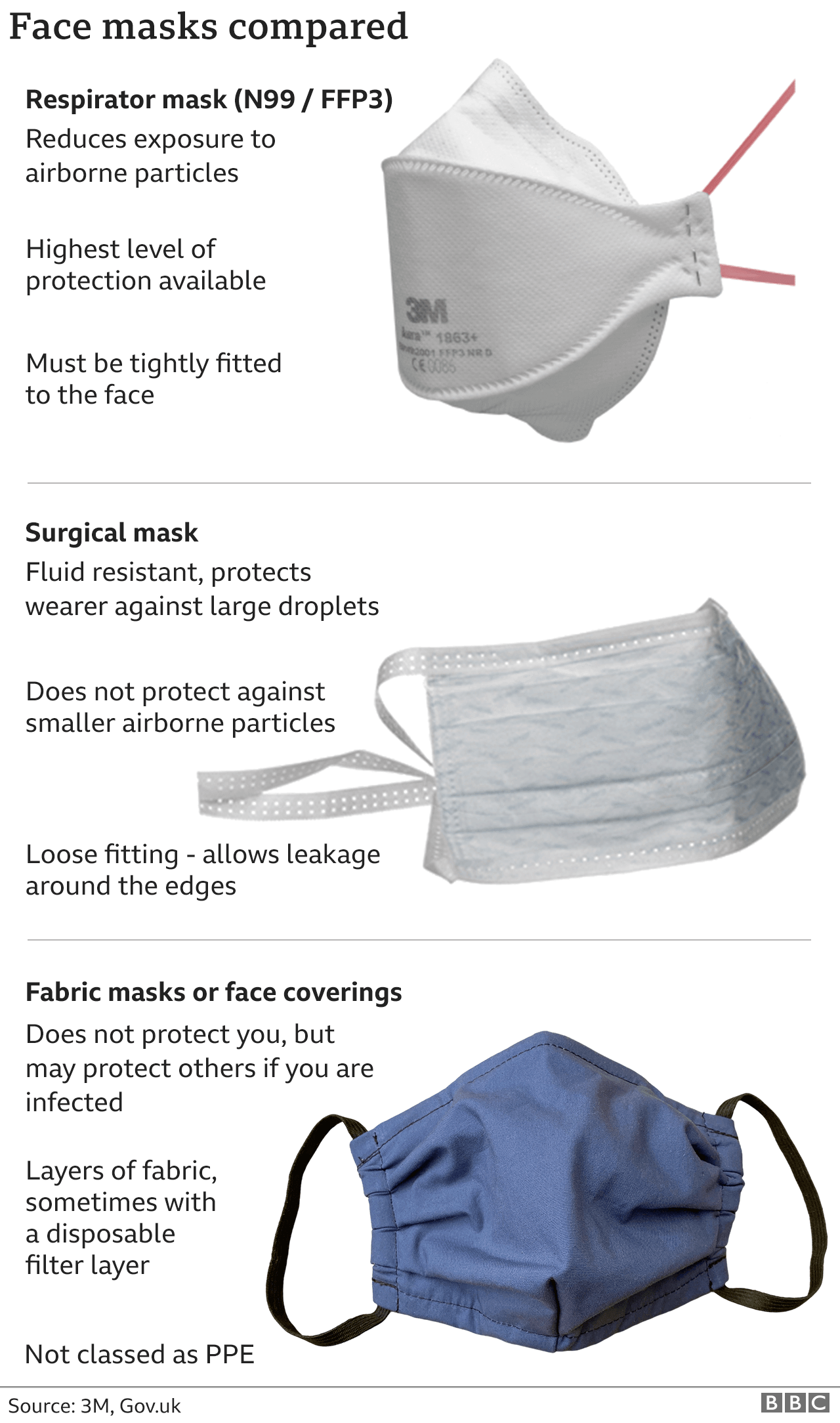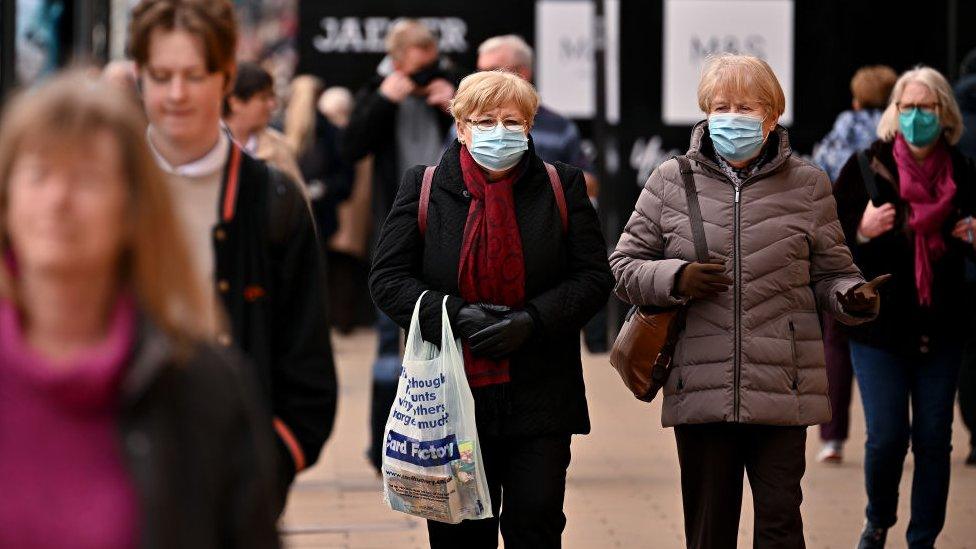What difference will lifting face mask laws make?
- Published

Scotland's face mask laws have been lifted, meaning there is now no legal requirement for people to cover their faces when they are in indoor settings such as shops and supermarkets or on public transport.
The move brings the country into line with the rest of the UK, but First Minister Nicola Sturgeon is still strongly advising people to continue wearing face masks voluntarily.
What difference will the change actually make?
In reality, face mask laws have not been strictly enforced in Scotland, with people generally going unchallenged by staff if they fail to wear one on a train or in a supermarket.
Experts believe making their use a legal requirement rather than voluntary made it more likely that people would comply, even if they were extremely unlikely to be fined for not doing so.
With the legal requirement now gone, it remains to be seen how widespread the use of face masks will continue to be.
Anecdotal evidence from England suggests that far fewer people are wearing them now than in the past, despite the UK government issuing similar advice to Ms Sturgeon on the importance of continuing to use them after the legal requirement was removed.
People in Scotland have generally been pretty good at following health advice during the pandemic, even if it has not been compulsory - there has never been a legal requirement to self-isolate after testing positive, for example, but most people did so regardless.
Despite the desire for things to return to some sort of normality now that the virus does not pose the same risk of death or serious illness as in the past, Ms Sturgeon hopes that people will choose to continue covering their face in public.
She has stressed that levels of the virus and the resulting pressure in the NHS remains very high, and that wearing a mask helps to keep vulnerable people safer.
But behavioural psychologists say people often copy what others are doing - and as more people stop wearing masks then it becomes harder to be the odd one out.
So should I still be wearing a face mask?

This ultimately comes down to how much risk you are willing to take - and how much risk you are willing to pose to other people.
The government says it strongly advises people to continue wearing face coverings in crowded or enclosed spaces where you are likely to come into contact with people you do not normally meet.
This includes places like shops, supermarkets, bars, restaurants and public transport where it is difficult to keep apart from other people and where there is often poor ventilation.
People will also have to continue wearing face coverings in healthcare settings, such as GP surgeries, hospitals and care homes.
And secondary school pupils will still have to cover their faces in communal areas such as corridors.
Should I change the type of mask I'm using?

The highly infectious new BA2 Omicron subvariant was largely responsible for the extremely high levels of Covid in Scotland in March, which saw the number of people in hospital with the virus hit record highs.
It is able to transmit itself very quickly because people need to inhale far fewer virus particles to become infected than they did with previous Covid strains.
This means surgical and fabric masks offer less protection than they did in the past because they allow more of the virus to get through than high-filtration respirator masks.
Dr Christine Tait-Burkard, an infectious diseases expert at the University of Edinburgh, said wearing a medical or fabric mask still helps to keep other people safe because they stop some shedding of the virus into the environment.
But she recommends that people at higher risk from the virus, such as the elderly or those with underlying health conditions, should upgrade to an FFP2 respirator mask to give themselves the best protection.
Single use surgical masks - which are often blue and are widely available to buy in shops - generally offer better protection to the wearer than reusable fabric masks.
If you do wear a reusable fabric mask, it should be made of two, or ideally three, layers and form a good fit around the nose and mouth.
Scarves, bandanas or religious garments are likely to be less effective if they do not fit securely around the mouth and nose and are of a single layer.
Is this the right time to be lifting the rules?

About 80% of people in Scotland are thought to have had the virus during the pandemic
The face mask laws had originally been due to be lifted on 21 March, but the move was delayed twice as infection rates soared.
The number of daily reported Covid cases in Scotland hit about 12,000 in March but the figure is now down to about 4,000.
Despite the latest figures showing that there were just over 2,000 Covid patients in Scottish hospitals, only 20 of these were in intensive care - which suggests that people are much less likely to become seriously ill than in the past.
With about 80% of people in Scotland having now had the virus, Dr Tait-Burkard said she believed the country has now reached a "tilting point" where it effectively has herd immunity, which she said is likely to mean the number of cases will fall without any additional measures having to be in place.
She said Scotland could largely be on course to follow the example of the Netherlands and Germany, where cases have fallen sharply in recent weeks despite all legal requirements including the wearing of face coverings being removed.
Dr Tait-Burkard said it would therefore now be "too big a force" to fine people for not wearing a face mask.
She added: "I think recommendations for people to wear masks in high risk environments is the right course of action.
"It doesn't need that legal enforcement any more."